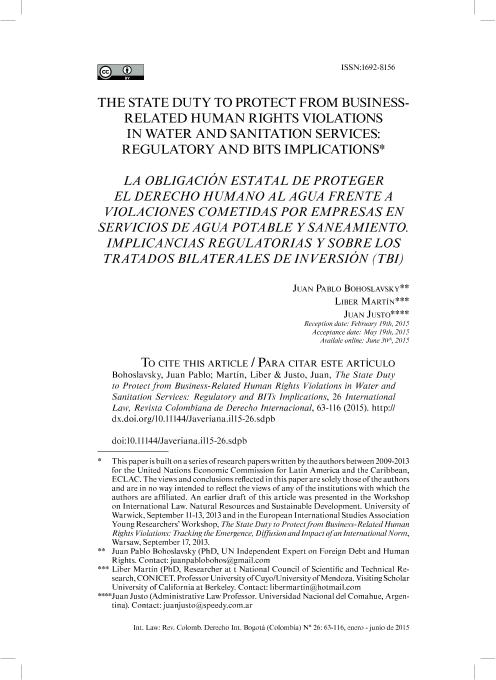Mostrar el registro sencillo del ítem
dc.contributor.author
Bohoslavsky, Juan Pablo Raimundo

dc.contributor.author
Martin, Liber Alexis

dc.contributor.author
Justo, Juan
dc.date.available
2018-10-11T19:49:17Z
dc.date.issued
2015-06
dc.identifier.citation
Bohoslavsky, Juan Pablo Raimundo; Martin, Liber Alexis; Justo, Juan; The State Duty to Protect from Business-Related Human Rights Violations in Water and Sanitation Services: Regulatory and BITs Implications; Pontificia Universidad Javeriana. Facultad de Ciencias Jurídica; International law; 26; 6-2015; 63-126
dc.identifier.issn
1692-8156
dc.identifier.uri
http://hdl.handle.net/11336/62243
dc.description.abstract
El derecho humano al agua ha sido objeto primordial de atención desde la Observación General número 15 (2002), que luego de mucho debate fue ratificada por Resolución de la Asamblea General de la Organización de Naciones Unidas, del 28 de julio de 2010. Mucho se ha escrito en general y de manera superficial sobre este derecho pero muy poco sobre las particulares conexiones que existen con las empresas privadas prestadoras de servicios públicos de aguapotable y saneamiento, su regulación interna e internacional. El articulo analiza la obligación estatal de proteger de violaciones cometidas por empresas, en el especifico ámbito de los servicios de agua potable y saneamiento desde dos frentes. Por un lado, el plano regulatorio interno, es decir: ¿en qué medida la regulación estatal de una empresa de agua privada es y/o debe estar basada en normas de derechos humanos? ¿Cuáles son las implicaciones normativas de esa respuesta? ¿ Qué tipo de regulaciones implica el deber de protección? ¿Ha delineado la jurisprudencia estándares mínimos de prestación fundados en normas internacionales de derechos humanos? En segundo lugar y en el plano de la responsabilidad internacional ¿De qué forma deben interpretase los tratados bilaterales de inversión —TBI— que protegen a las empresas prestadoras de servicios públicos de agua potable y saneamiento como inversores con relación al deber de protección estatal basado en normas de derechos humanos? ¿ Cómo compatibilizar, en definitiva, los compromisos asumidos en los TBI con las obligaciones emanadas de los tratados de derechos humanos en el especifico ámbito de la prestación de los servicios de agua potable y saneamiento?
dc.description.abstract
The Human Right to Water and Sanitation —HRWS— has called primary attention since General Comment No. 15 (GC 15) —issued in 2002 by the UN Committee on Economic, Social, and Cultural Rights, CESCR— interpreted articles 11 and 12 of the International Covenant on Economic, Social, and Cultural Rights (ICESCR). Since then, much has been written on this human right, but very little on the existing linkage between it and private corporations providing public water and sanitation services (WSS), and even less on the regulatory and Bilateral Investment Treaties (BITs) implications of the state's duty to protect this right. This article will therefore study the state's duty to protect from business-related human rights violations in the specific field of WSS from two interrelated perspectives. On one hand, the domestic regulatory front, which raises questions such as: Should regulation of private water and sanitation companies be based on human rights standards? If so, to what extent? What are the concrete regulatory implications of the two previous responses? Has existing case law outlined minimum regulatory standards based on international human rights norms? On the other hand, in terms of international liability, the following que stions are crucial: How should we interpret BITs that protect foreign companies providing water and sanitation in light of the state's duty to protect from business-related human rights violations? How to reconcile the state's BITs commitments with its obligations under human rights treaties in WSS? Do we need to reconcile them at all?
dc.format
application/pdf
dc.language.iso
eng
dc.publisher
Pontificia Universidad Javeriana. Facultad de Ciencias Jurídica
dc.rights
info:eu-repo/semantics/openAccess
dc.rights.uri
https://creativecommons.org/licenses/by-nc-sa/2.5/ar/
dc.subject
Human Rights
dc.subject
Water And Sanitation Services
dc.subject
The State Duty to Protect
dc.subject
Bit
dc.subject.classification
Otras Derecho

dc.subject.classification
Derecho

dc.subject.classification
CIENCIAS SOCIALES

dc.title
The State Duty to Protect from Business-Related Human Rights Violations in Water and Sanitation Services: Regulatory and BITs Implications
dc.title
La obligación estatal de proteger el derecho humano al agua frente a violaciones cometidas por empresas en servicios de agua potable y saneamiento: Implicancias regulatorias y sobre los tratados bilaterales de inversión (TBI)
dc.type
info:eu-repo/semantics/article
dc.type
info:ar-repo/semantics/artículo
dc.type
info:eu-repo/semantics/publishedVersion
dc.date.updated
2018-09-14T14:14:14Z
dc.journal.number
26
dc.journal.pagination
63-126
dc.journal.pais
Colombia

dc.journal.ciudad
Bogotá
dc.description.fil
Fil: Bohoslavsky, Juan Pablo Raimundo. Organización de Las Naciones Unidas; Argentina
dc.description.fil
Fil: Martin, Liber Alexis. Universidad Nacional de Cuyo; Argentina. Consejo Nacional de Investigaciones Científicas y Técnicas. Centro Científico Tecnológico Conicet - Mendoza; Argentina
dc.description.fil
Fil: Justo, Juan. Universidad Nacional del Comahue; Argentina
dc.journal.title
International law
dc.relation.alternativeid
info:eu-repo/semantics/altIdentifier/url/http://ref.scielo.org/57jc3d
dc.relation.alternativeid
info:eu-repo/semantics/altIdentifier/doi/https://dx.doi.org/10.11144/Javeriana.il15-26.sdpb
Archivos asociados
